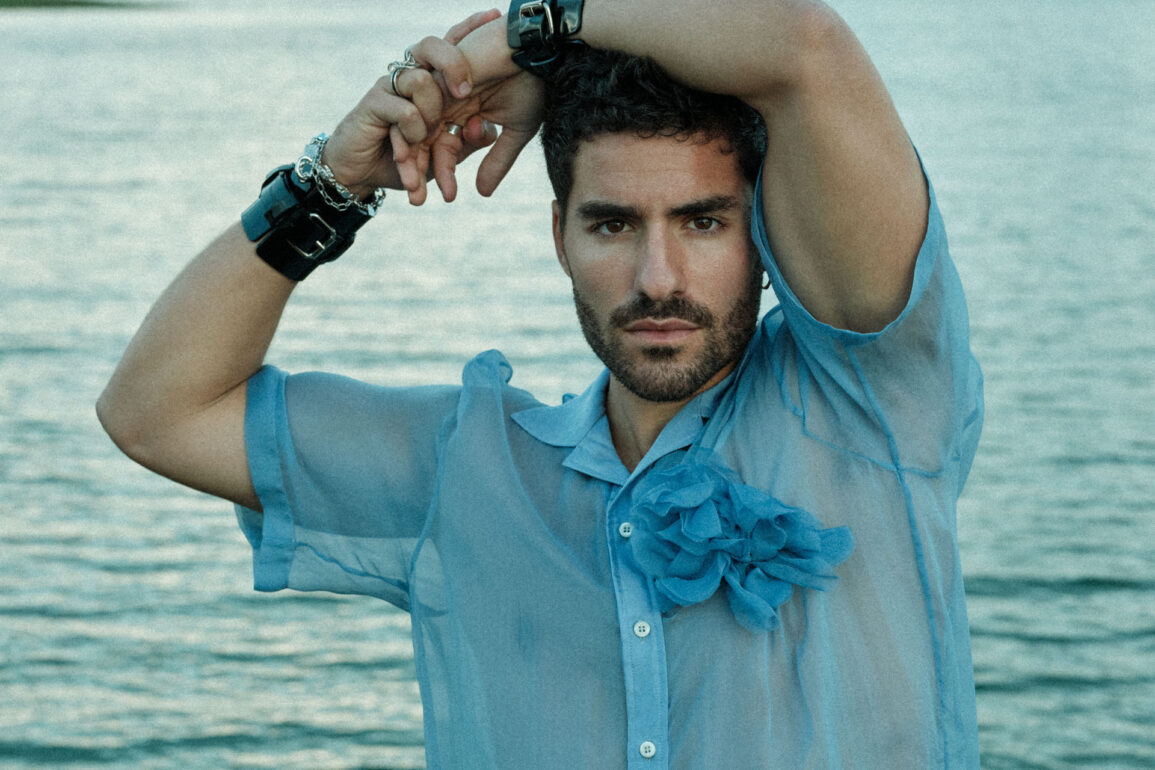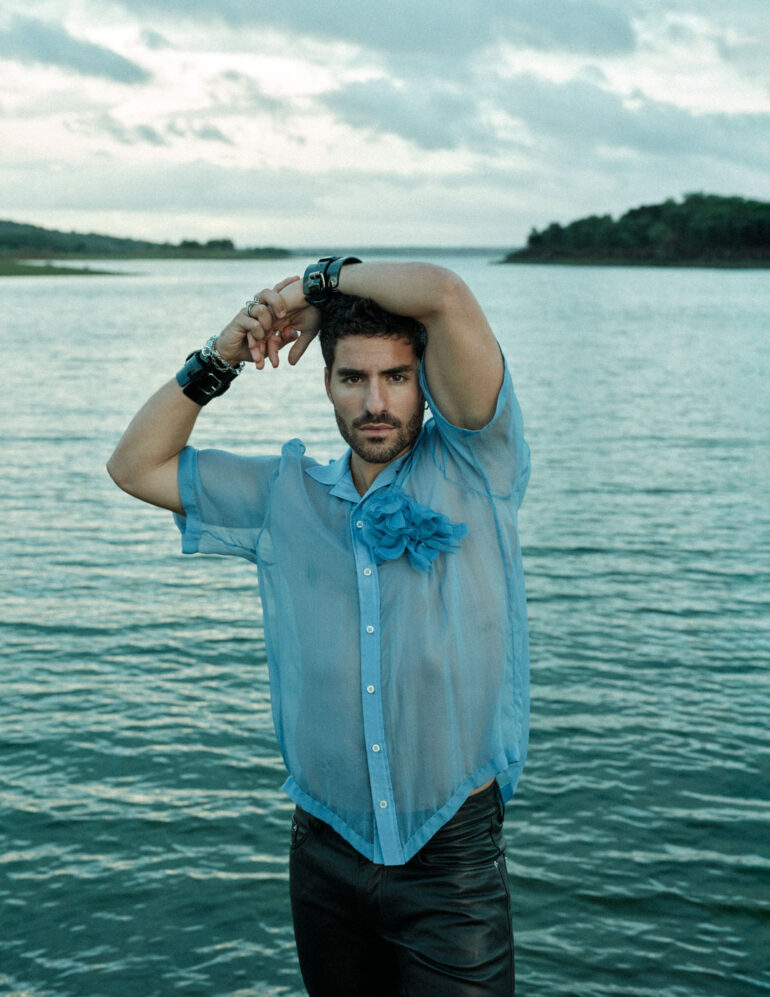Words: Cláudia Pinto
He’s one of the most renowned actors of his generation, and he’s setting the pace for the future. He was the youngest Hamlet in Europe, stars in an international series on one of the world’s biggest streaming platforms and is part of the cast in a film by one of the world’s most respected directors. However, the theatre is at the heart of his personality and his work.
The amateur’s love
Condessa’s professional history merges with his private life. “People often ask ‘When did you know you wanted to be an actor?’” I don’t remember. I remember the moment when I realised that I didn’t want to stop being an actor, because I had always been one in one way or another”.
His artistic life began “with my father, when I was about 4 or 5 years old, in an amateur theatre group in Belém. He had always been an amateur actor, and several people in my family were also in the group. I fell in love with theatre and the art of acting because it was an extension of my father’s love. Seeing him on stage, wanting to do what he did, being like him, having the ability to memorise the lines just by listening to them”.
But being an amateur is much more than a hobby. “To be an amateur actor — we often joke about this expression — is to be someone who loves. You’re there out of passion for the art, for the team, for the group. And everyone has their own routine, their daily work, their stories, their patience. This is my reality at the beginning of the theatre”.
“My first experience on stage was there, with a Portuguese revue, when I was very young, with my father telling me the text so I could learn it by heart, because I couldn’t read”. After several years in the theatre, Condessa joined the Santo Amaro Academy, where he was already doing other types of shows, first in the children’s group and then in the older groups. “I began to learn from the older ones who had a similar spirit: a love of the theatre, respect for the transversal union. It was here that I learned to be a stage manager, to make props, work in the rigging, create sets and be a prompter. We all did a bit of everything. We were only as good as our team. I may be the face of it, but it’s always teamwork. And in 2012, I went to Drama School”.
Always returning to the boards
The love of treading the boards seems indescribable to those who feel it, and the stage remains a sacred space for the actor. “The theatre is my place; I simply can’t give it up. It nourishes me in a unique way. After entering Drama School, in 2013 I joined the Cascais Experimental Theatre at the invitation of my mentor, Carlos Avillez. That’s where I turned professional, and since then I’ve performed in 13 plays at TECA and 23 in total. I’ve always kept it up, always balanced it with film and television work”.
“What fascinates me is being able to be an actor — which is what I’ve always tried to be — to make myself versatile from the start. There’s a division between being a television actor, a theatre actor and a film/series actor. I truly believe we need to be different in each medium; we need to act differently: our voice, body, gaze. On stage, I can’t work with just my eyes, whereas with a camera, for instance, I can. The magic of being able to adapt to wherever I am, always grounded in truth, has been my constant aim — to never seem out of place. When I’m in the theatre, I don’t want people thinking I’m a TV actor”.
If an actor is compared to an athlete, then a play is a marathon and requires months of preparation to maintain authenticity. We must be ready to perform everything as if it were the first time”. The audience always deserves the truth, and we must be capable of delivering that. “Not just living for the applause, but nurturing it”, he explains in respect of the theatre.
“Television soap operas are more like sprints, demanding several scenes each day, with less time for exploration, requiring agility in the portrayal of characters. Film and series work sits somewhere in between, requiring months of preparation but without the sprint-like nature of soap operas. I’m fascinated by being recognised across these different stages”.
The sports analogy isn’t unusual. Football is another of José’s passions. He played for Benfica and currently plays for Nisa. “Competition — when healthy — is good. It forces us to grow: both ourselves and others. To look around, show capability, lift our heads. Pass the ball to another and make them believe. These are very important lessons”.
Turn off the Tide
Netflix released Turn of the Tide to the world in 2023. It quickly became the platform’s most-watched Portuguese series ever and one of the most-watched non-English language series globally. With José as the star, it’s fair to say this moment was a turning point in his career. One of the reasons for the success of the series was that it “brought together very good professionals: technical team, actors, makeup artists. And, above all, professionals who admire each other. It’s so beautiful when that happens. I must highlight Augusto Fraga’s work and the freedom we had simply because we had time — it allowed us to have three screenwriters working for months to create a solid script, which is one of the factors behind the show’s success. Moreover, the character selection was very meticulous”.
“There’s a notable curiosity here. We all had connections with each other, we knew each other very well, and that enhanced our rehearsals. Of course, we could have done it with other people, but we had many weeks of intense work developing our characters and their relationships. Who were these characters before we arrived? What was their story? All of this contributed to making it the most-watched Portuguese series ever and one of the most-watched non-English language series globally”.
Interestingly, Turn of the Tide’s premiere coincided with Almodóvar’s film release. “Suddenly I was in two fictional worlds on the same day. It was extraordinary. He’s a genius, and for me — and any actor — he’s someone to look up to. He’s the closest we have to someone who is globally renowned in this field. He’s the first Latin filmmaker to break into the Hollywood industry, to win awards… and to launch actors onto the world stage. He was already a role model for me. And how he deals with sensitive subjects without any inhibition”.
Portuguese Shoes
José Condessa is now the international face of the Portuguese Shoes campaign. “I’ve never hidden the fact that one of my missions — besides being a versatile actor — is to bring Portugal to the world. We’re at a global turning point; we’re not just competing against each other, we’re producing films and series for the world, competing between channels and producers and at an international level. And are capable of doing this. I want to be part of the generation that brings Portugal to the world. Turn of the Tide is a Portuguese series, spoken in Portuguese, with Portuguese people, competing with other series worldwide. And being an ambassador for an industry where I carry the ‘Made in Portugal’ banner is extraordinary. We belong on the world stage, and we have what it takes to be there. I feel this responsibility in a very positive way”.
Looking at him as the fifth element gives him a Midas touch, which we suspect — if he wasn’t born with it — has been etched into his skin. In the game of elements, we know well that he could be all of them.
But when you can be anything, which do you choose to be? “It would be obvious to choose fire, because of the profession, but water makes more sense as an actor, because of how you must mould yourself and adapt to circumstances. Water has that capacity to flow and to be energy, to have strength despite being light and fluid. And that’s how I’d like to see myself in my profession. On the personal side, I’m more earth, more rooted, which ends up nourishing others and nourishes me for life. Family, traditions, the good side of this tradition. It’s difficult to choose just one. But I’d say water best defines me”.
The elements in theatre
Working as an actor, I often use the concept of elements as a foundation for building characters. I’ve been a little bit of all of them.
Characters are different people, and the foundation of elements helps in that construction. I also use animals to help. This came from Carlos Avillez’s teachings, which is where each character begins.
A dark and imposing character, with strength and more nervous energy, is fire. A water-like energy is more adaptable, with natural strength but calmer. It knows how to turn situations to its advantage. A more passionate character might be more connected to air. Earth might be more connected to someone who is more rational, more tied to roots and traditions. It’s very easy to use a bit of each to create a rounded character.



